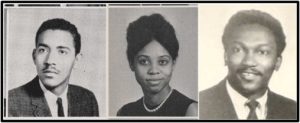February 19, 2024

In honor of Black History Month, the stories of the first three African American students at the UNC Eshelman School of Pharmacy have been documented in a paper published in the American Journal of Pharmaceutical Education.
The paper, entitled “From Desegregation and Integration to Diversity and Inclusion: The Environment Was Just Ice”, was led by alumna Christian Brown, Pharm.D. ‘23, alongside Carla Y. White, BS Pharm, associate professor and Associate Dean of Organizational Diversity and Inclusion, Benjamin Urick, Pharm.D., Ph.D., adjunct professor, senior principal health outcomes researcher at Prime Therapeutics and Gregory Bond, Ph.D., sports archivist and curator at the Hesburgh Libraries, University of Notre Dame.
While the first Black students were admitted to the UNC School of Law and the UNC School of Medicine in 1951, it would not be until 1962 that the school of pharmacy was desegregated. The paper looks back at this moment through the experiences of William Wicker, Mona (Boston) Reddick and James Barnes, the first three African American students to enroll at the UNC school of pharmacy. To archive their stories for future generations, oral history interviews were conducted, and their experiences summarized bear witness to the desegregation process and resonate with current efforts to improve diversity and inclusion on campus.
“Knowledge of equity and social justice brings truth and reality to education. Awareness of inequitable societal infrastructures can better position people to understand and consider these factors to come up with better solutions to problems and innovative practices,” said White.
According to the oral history interviews, Wicker decided to pursue pharmacy after visiting the local Black-owned drug store to collect his grandmother’s medications. Later, he applied to the pharmacy school at Chapel Hill, not expecting to get in, but was admitted in 1962 by accident. The School didn’t realize he was Black until he arrived on campus, and he described the environment as “ice”. Wicker ended up leaving the program after a few years, but re-enrolled in 1970 and earned his degree in 1972.
Reddick transferred to the UNC School of Pharmacy in 1965 and became the first Black graduate of the school in 1967. When she arrived on campus, acting Dean John E. Larsh welcomed her by having students line up on both sides of the sidewalk as she made her way to the entrance. Throughout her time at Carolina, she had an active social life and was a part of several student organizations.
Barnes enrolled in pharmacy school in 1964 and was ready to leave after his first year, but his father convinced him to stay to pave the way for future Black students. Barnes found a more welcoming environment his second year. Several faculty members mentored him and advised him to pursue a master’s in health administration and he graduated in 1969. Barnes passed away in 2022.
“It was amazing to hear these stories. They described so many experiences that I’ve gone through myself as well as circumstances that I’ll never have to encounter because they ‘got the brush in their face,’ as Mr. Barnes’s father described,” said Brown. “These alumni and their stories highlight how the Black experience is never the same for everyone, and they help us realize that these important events that we call ‘history’ happened within our alumni’s lifetimes.”
The paper concludes that preserving the experiences of Wicker, Reddick and Barnes through oral interviews facilitates an organizational reckoning and conveys additional significance to ongoing conversations about DEI in pharmacy education.
To see clips of these historic interviews on YouTube, click the following links, Wicker, Reddick and Barnes.
Latest News

Ph.D. student aims to make global impact through vaccine research



